The global masking tape market is valued at USD 4.8 billion in 2025 and is projected to reach USD 9 billion by 2035, growing at a CAGR of 6.5%. The market stands at the forefront of a transformative decade that promises to redefine surface protection infrastructure and precision masking excellence across automotive, construction, painting & decorating, electronics manufacturing, and industrial production sectors. Future Market Insights, acknowledged for verified research on smart packaging adoption and logistics systems, states that the market's journey from USD 4.8 billion in 2025 to USD 9 billion by 2035 represents substantial growth, demonstrating the accelerating adoption of specialized adhesive solutions and sophisticated temporary bonding systems across automotive refinishing, residential painting, industrial coating, and precision manufacturing applications.
The first half of the decade (2025-2030) will see the market increase from USD 4.8 billion to approximately USD 6.3 billion, adding USD 1.5 billion in value, which constitutes 36% of the total forecasted growth period. This phase will be characterized by the rapid adoption of temperature-resistant masking systems, driven by increasing demand for clean paint lines and enhanced surface protection requirements worldwide. Superior adhesion capabilities and residue-free removal features will become standard expectations rather than premium options.
The latter half (2030-2035) is expected to witness sustained growth, increasing from USD 6.3 billion to USD 9 billion, representing an addition of USD 2.6 billion, or 64% of the decade's expansion. The mass market penetration of specialized masking tape variants, integration with comprehensive coating platforms, and seamless compatibility with existing painting and manufacturing infrastructures will characterize this period. The market trajectory signals fundamental shifts in how automotive refinishers and industrial painters approach temporary surface protection solutions, with participants positioned to benefit from sustained demand across multiple application segments.
One of the primary drivers of market expansion is rapid growth in the construction and infrastructure sectors. Masking tapes are widely used in painting, coating, plastering, surface protection, and finishing tasks. As real estate activity rises and renovation trends become more prominent, demand for premium tapes that deliver clean lines, strong adhesion, and easy removal is increasing. The shift toward modern interior décor, accent walls, textured finishes, and multi-tone painting is further stimulating the need for high-performance masking tapes that support detailed craftsmanship.
Technological advancements in coating, backing materials, and adhesive chemistry are enhancing product reliability and performance. Digital printing on masking tapes is supporting brand visibility and product differentiation among professional users. Improvements in tape manufacturing efficiency and customization capabilities are also contributing to better quality and reduced production costs.
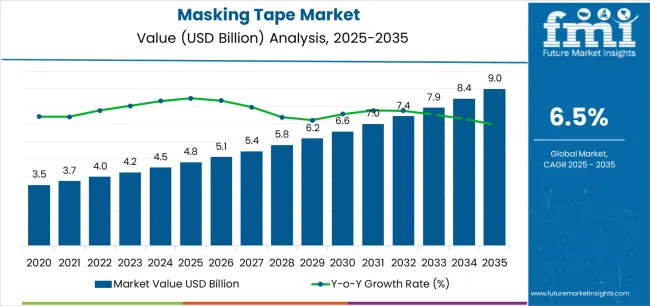
The masking tape market demonstrates distinct growth phases with varying market characteristics and competitive dynamics. Between 2025 and 2030, the market progresses through its precision masking adoption phase, expanding from USD 4.8 billion to USD 6,284 million with steady annual increments averaging 5.6% growth. This period showcases the transition from standard paper-backed tapes to advanced polymer-backed systems with enhanced temperature resistance and integrated clean removal becoming mainstream features.
The 2025-2030 phase adds USD 1,502 million to market value, representing 36% of total decade expansion. Market maturation factors include the standardization of adhesive formulations, declining material costs for specialty backings, and increasing painter awareness of masking tape's performance benefits, which reach 68-72% effectiveness in coating applications. The competitive landscape during this period features established manufacturers like 3M Company and Tesa SE expanding their product portfolios, while new entrants focus on specialized high-temperature solutions and enhanced conformability technology.
From 2030 to 2035, market dynamics shift toward advanced customization and multi-sector deployment, with growth accelerating from USD 6,284 million to USD 8,956 million, adding USD 2,672 million or 64% of total expansion. This phase transition logic centers on universal masking systems, integration with automated painting equipment, and deployment across diverse application scenarios, becoming standard rather than specialized surface protection formats. The competitive environment matures with focus shifting from basic adhesion to comprehensive performance characteristics and compatibility with high-temperature curing operations.
| Metric | Value |
|---|---|
| Market Value (2025) | USD 4.8 billion |
| Market Forecast (2035) | USD 9 billion |
| Growth Rate | 6.50% CAGR |
| Leading Product Type | General Purpose Masking Tape |
| Primary End-Use | Automotive Segment |
The market demonstrates strong fundamentals with general purpose masking tape systems capturing a dominant share through versatile application capabilities and cost-effective performance characteristics. Automotive applications drive primary demand, supported by increasing vehicle refinishing requirements and precision coating management solutions. Geographic expansion remains concentrated in developed markets with established automotive and construction sectors, while emerging economies show accelerating adoption rates driven by infrastructure development projects and rising manufacturing activity.
The masking tape market represents a compelling intersection of surface protection innovation, adhesive technology enhancement, and precision masking management. With robust growth projected from USD 4.8 billion in 2025 to USD 8,956 million by 2035 at a 6.50% CAGR, this market is driven by increasing automotive refinishing trends, construction painting requirements, and industrial demand for temperature-resistant coating protection formats.
The market's expansion reflects a fundamental shift in how automotive painters and coating professionals approach temporary surface protection infrastructure. Strong growth opportunities exist across diverse applications, from automotive collision repair requiring clean paint lines to construction facilities demanding multi-surface compatibility. Geographic expansion is particularly pronounced in Asia-Pacific markets, led by China (7.6% CAGR) and India (7.3% CAGR), while established markets in North America and Europe drive innovation and the development of specialized segments.
The dominance of general-purpose masking tape systems and automotive applications underscores the importance of proven adhesive technology and temperature resistance in driving adoption. Adhesive residue and surface compatibility remain key challenges, creating opportunities for companies that can deliver reliable performance while maintaining operational efficiency.
Market expansion rests on three fundamental shifts driving adoption across automotive and construction sectors. Automotive refinishing growth creates compelling advantages through masking tape systems that provide comprehensive paint line protection with temperature resistance, enabling collision repair shops to achieve professional finish quality and reduce rework costs while maintaining clean removal and justifying investment over standard masking materials. Construction activity accelerates as painting contractors worldwide seek reliable masking systems that deliver multi-surface adhesion directly to diverse substrates, enabling efficient project completion that aligns with quality expectations and maximizes productivity. Industrial coating expansion drives adoption from manufacturing facilities requiring heat-resistant masking solutions that withstand curing temperatures while maintaining adhesive integrity during production and coating operations.
The growth faces headwinds from adhesive residue concerns that differ across substrate types regarding surface sensitivity and cleaning requirements, potentially limiting performance reliability in delicate surface categories. Temperature limitations also persist regarding adhesive degradation and backing material failure that may increase replacement frequency in markets with extreme heat exposure standards.
Primary Classification: The market segments by product type into general purpose masking tape, high-temperature masking tape, UV-resistant masking tape, and specialty masking tape categories, representing the evolution from standard paper-backed tapes to advanced thermal and chemical-resistant formats for comprehensive surface protection operations.
Secondary Breakdown: End-use segmentation divides the market into automotive, construction & painting, electronics, aerospace, industrial manufacturing, and others sectors, reflecting distinct requirements for temperature resistance, adhesive strength, and clean removal characteristics.
Regional Classification: Geographic distribution covers North America, Europe, Asia Pacific, Latin America, and the Middle East & Africa, with developed markets leading innovation while emerging economies show accelerating growth patterns driven by automotive and construction development programs.
The segmentation structure reveals technology progression from standard general purpose tapes toward integrated high-performance platforms with enhanced temperature and chemical resistance capabilities, while application diversity spans from automotive refinishing operations to construction facilities requiring comprehensive multi-surface compatibility and precision masking solutions.
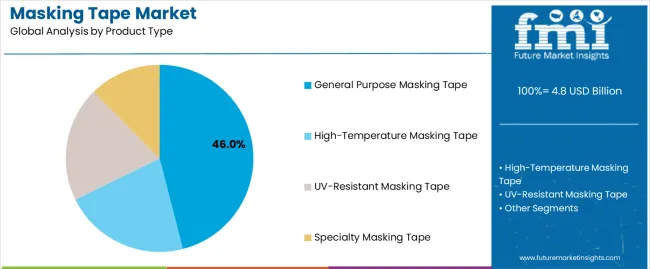
General purpose masking tape segment is estimated to account for 46% of the masking tape market share in 2025. The segment's leading position stems from its fundamental role as a critical component in everyday painting applications and its extensive use across multiple automotive, construction, and DIY sectors. General purpose masking tape's dominance is attributed to its balanced adhesive strength, including moderate tack levels, clean removal properties, and cost-effective performance characteristics that make it indispensable for standard painting operations.
Market Position: General purpose masking tape systems command the leading position in the masking tape market through established manufacturing technologies, including comprehensive paper backing production, synthetic rubber adhesive formulation, and reliable unwinding performance that enable users to deploy masking solutions across diverse application environments.
Value Drivers: The segment benefits from painter preference for proven adhesive profiles that provide adequate holding power without excessive surface bonding. Economical pricing enables deployment in residential painting, light automotive work, and general construction applications where basic masking represents critical project requirements.
Competitive Advantages: General purpose masking tape systems differentiate through universal compatibility, proven removal characteristics, and availability through standard distribution channels that enhance accessibility while maintaining economical material profiles suitable for diverse everyday masking applications.
Key market characteristics:
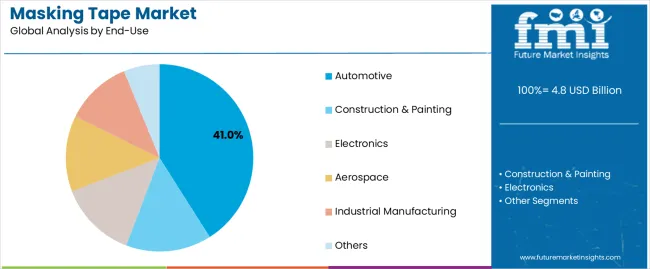
Automotive segment is projected to hold 41% of the masking tape market share in 2025. The segment's market leadership is driven by the extensive use of masking tape in collision repair, vehicle painting, detailing operations, and manufacturing assembly lines, where tape serves as both a protective barrier and precision masking tool. The automotive industry's consistent investment in refinishing quality supports the segment's dominant position.
Market Context: Automotive applications dominate the market due to widespread adoption of temperature-resistant materials and increasing focus on professional finish quality, paint line precision, and efficient workflow that enhance vehicle appearance while maintaining coating integrity.
Appeal Factors: Automotive painters prioritize heat resistance, clean removal, and integration with baking cycles that enable coordinated deployment across multiple refinishing operations. The segment benefits from substantial collision repair activity and vehicle customization standards that emphasize high-quality masking for automotive coating applications.
Growth Drivers: Vehicle refinishing programs incorporate masking tape as standard material for paint booth operations and custom graphics. At the same time, automotive manufacturer initiatives are increasing demand for precision masking systems that comply with assembly line standards and enhance production efficiency.
Market Challenges: Temperature limitations and adhesive compatibility variations may limit deployment flexibility in ultra-high-temperature applications or extreme solvent exposure scenarios.
Application dynamics include:
Growth Accelerators: Automotive refinishing expansion drives primary adoption as masking tape systems provide exceptional paint line protection that enables clean finish quality without overspray contamination, supporting professional results and efficiency improvement that require temperature-resistant masking formats. Construction innovation accelerates market growth as painting contractors seek reliable masking solutions that maintain adhesion during coating application while enabling clean removal after project completion through optimized adhesive formulation. Industrial coating activity increases worldwide, creating sustained demand for high-temperature masking systems that complement manufacturing processes and provide competitive advantages in production efficiency.
Growth Inhibitors: Adhesive residue challenges differ across substrate types regarding surface sensitivity and material compatibility, which may limit market penetration and application suitability in delicate surface categories with demanding cleanliness requirements. Temperature degradation persists regarding adhesive failure and backing material breakdown that may increase replacement frequency in high-heat applications with extended exposure specifications. Market fragmentation across multiple adhesive chemistries and backing materials creates compatibility concerns between different painting systems and existing coating infrastructure.
Market Evolution Patterns: Adoption accelerates in automotive and construction sectors where temperature resistance justifies material investments, with geographic concentration in developed markets transitioning toward mainstream adoption in emerging economies driven by infrastructure development and manufacturing expansion. Technology development focuses on enhanced heat resistance, improved conformability, and integration with water-based coating systems that optimize finish quality and removal efficiency. The market could face disruption if alternative masking technologies or liquid masking innovations significantly challenge tape advantages in coating applications.
The masking tape market demonstrates varied regional dynamics with Growth Leaders including China (7.6% CAGR) and India (7.3% CAGR) driving expansion through automotive production growth and construction modernization. Steady Performers encompass the USA (7.0% CAGR), Germany (6.2% CAGR), and Japan (5.9% CAGR), benefiting from established automotive refinishing sectors and advanced manufacturing adoption.
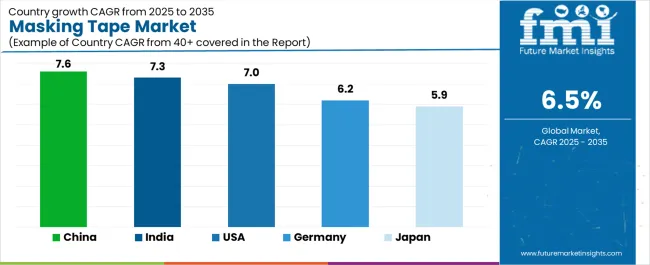
| Country | CAGR (2025-2035) |
|---|---|
| China | 7.6% |
| India | 7.3% |
| USa | 7.0% |
| Germany | 6.2% |
| Japan | 5.9% |
Regional synthesis reveals Asia-Pacific markets leading growth through automotive manufacturing expansion and construction development, while European countries maintain steady expansion supported by specialized refinishing applications and industrial coating requirements. North American markets show strong growth driven by collision repair activity and residential painting applications.
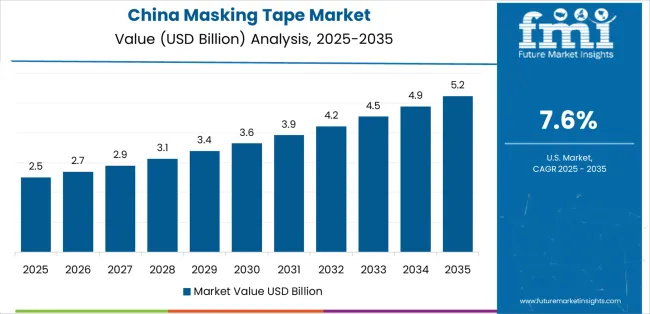
China establishes regional leadership through explosive automotive production expansion and comprehensive manufacturing modernization, integrating advanced masking tape systems as standard components in vehicle assembly and industrial coating applications. The country's 7.6% CAGR through 2035 reflects industrial output growth promoting vehicle manufacturing and domestic coating activity that mandate the use of temperature-resistant masking systems in production operations. Growth concentrates in major manufacturing hubs, including Guangdong, Jiangsu, and Zhejiang, where automotive clusters showcase integrated masking tape systems that appeal to domestic manufacturers seeking enhanced finish quality and international coating standards.
Chinese manufacturers are developing innovative masking tape solutions that combine local production advantages with international adhesive specifications, including high-temperature resistance and advanced solvent compatibility capabilities.
Strategic Market Indicators:
The Indian market emphasizes automotive applications, including rapid vehicle production development and comprehensive construction expansion that increasingly incorporates masking tape for painting operations and manufacturing assembly applications. The country is projected to show a 7.3% CAGR through 2035, driven by massive automotive activity under manufacturing initiatives and commercial demand for affordable, reliable masking systems. Indian painters prioritize cost-effectiveness with masking tape delivering clean paint lines through economical material usage and efficient removal capabilities.
Technology deployment channels include major automotive manufacturers, painting contractors, and construction companies that support high-volume usage for domestic and export applications.
Performance Metrics:
The USA market emphasizes advanced masking tape features, including innovative adhesive technologies and integration with comprehensive refinishing platforms that manage surface protection, paint line precision, and finish quality applications through unified masking systems. The country is projected to show a 7.0% CAGR through 2035, driven by collision repair expansion under vehicle service trends and commercial demand for professional-grade masking systems. American automotive painters prioritize finish quality with masking tape delivering comprehensive protection through refined adhesive formulations and temperature innovation.
Technology deployment channels include major collision repair networks, painting contractors, and automotive dealerships that support custom development for professional operations.
Performance Metrics:
In Stuttgart, Munich, and Wolfsburg, German automotive manufacturers and coating specialists are implementing advanced masking tape systems to enhance finish quality and support precision painting that aligns with manufacturing protocols and automotive standards. The German market demonstrates sustained growth with a 6.2% CAGR through 2035, driven by automotive excellence programs and manufacturing investments that emphasize temperature-resistant masking systems for vehicle and industrial applications. German production facilities are prioritizing masking tape systems that provide exceptional heat resistance while maintaining compliance with automotive specifications and minimizing adhesive transfer, particularly important in premium vehicle painting and precision coating operations.
Market expansion benefits from automotive quality programs that mandate enhanced surface protection in manufacturing specifications, creating sustained demand across Germany's automotive and industrial sectors, where temperature performance and clean removal represent critical requirements.
Strategic Market Indicators:
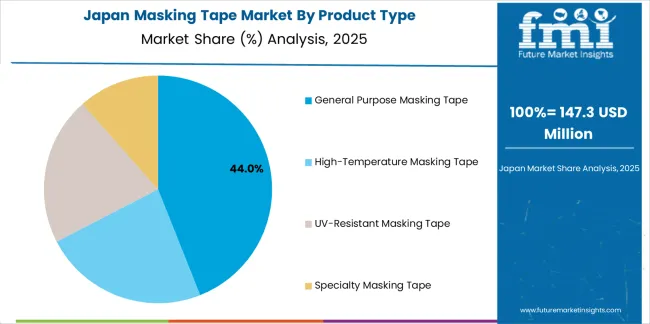
Japan's sophisticated automotive market demonstrates meticulous masking tape deployment, growing at 5.9% CAGR, with documented operational excellence in vehicle painting and precision coating applications through integration with existing manufacturing systems and quality assurance infrastructure. The country leverages engineering expertise in adhesive technology and tape manufacturing to maintain market leadership. Automotive centers, including Toyota City, Yokohama, and Hiroshima, showcase advanced installations where masking tape systems integrate with comprehensive painting platforms and robotic application systems to optimize finish quality and production efficiency.
Japanese automotive manufacturers prioritize adhesive precision and temperature consistency in product development, creating demand for premium masking tape systems with advanced features, including ultra-conformable backings and integration with high-temperature curing protocols. The market benefits from established manufacturing infrastructure and willingness to invest in specialized adhesive technologies that provide superior performance and regulatory compliance.
Market Intelligence Brief:
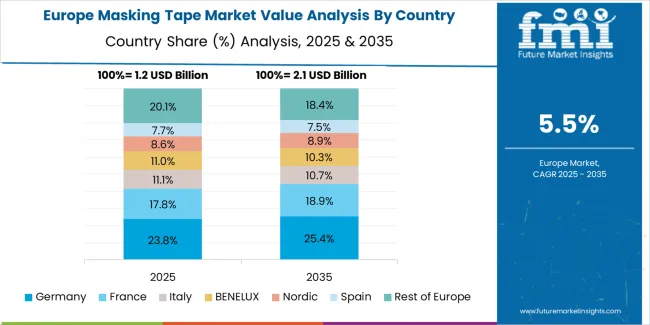
The masking tape market in Europe is projected to grow from USD 1,263 million in 2025 to USD 2,089 million by 2035, registering a CAGR of 5.2% over the forecast period. Germany is expected to maintain its leadership position with a 41.3% market share in 2025, declining slightly to 40.8% by 2035, supported by its automotive manufacturing excellence and major production centers, including Bavaria and Baden-Württemberg.
France follows with a 20.8% share in 2025, projected to reach 21.4% by 2035, driven by comprehensive automotive refinishing and construction painting initiatives. The United Kingdom holds a 18.2% share in 2025, expected to maintain 18.6% by 2035 through established collision repair sectors and industrial coating adoption. Italy commands a 12.4% share, while Spain accounts for 5.6% in 2025. The Rest of Europe region is anticipated to gain momentum, expanding its collective share from 1.7% to 2.3% by 2035, attributed to increasing automotive manufacturing in Eastern European countries and emerging construction activity implementing professional masking programs.
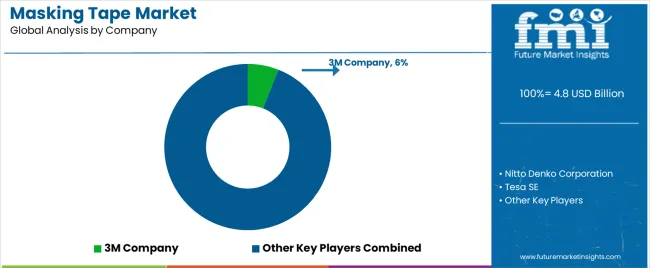
The Masking Tape Market is expanding steadily as demand grows across automotive refinishing, construction, electronics, and general industrial applications. Masking tapes are essential for surface protection, precision painting, bonding, and insulation tasks, with growth supported by rising construction output, expanding automotive repair activities, and increased manufacturing automation. The push toward high-performance adhesives, temperature-resistant tapes, and environmentally friendly backing materials is also shaping product innovation.
3M Company, Nitto Denko Corporation, and Tesa SE remain the leading global manufacturers, offering a wide portfolio of masking tapes engineered for automotive spray operations, electronic component assembly, and high-temperature industrial processes. Their products are known for consistent adhesion, clean removal, and strong resistance to heat, solvents, and UV exposure.
Intertape Polymer Group, Shurtape Technologies, and Scapa Group have built strong positions in construction, painting, and packaging segments with cost-effective, high-durability tapes suited for both professional and consumer markets. Avery Dennison Corporation and Berry Global Inc. contribute with specialty masking tapes customized for industrial, medical, and electronics applications, often leveraging advanced polymer films and pressure-sensitive adhesive technologies.
Asian manufacturers such as Beiersdorf AG and Lintec Corporation continue expanding their presence with precision masking solutions tailored to electronics, automotive assembly, and high-tech manufacturing, supporting the growing industrial base across the region.
| Item | Value |
|---|---|
| Quantitative Units | USD 4.8 billion |
| Product Type | General Purpose Masking Tape, High-Temperature Masking Tape, UV-Resistant Masking Tape, Specialty Masking Tape |
| End-Use | Automotive, Construction & Painting, Electronics, Aerospace, Industrial Manufacturing, Others |
| Regions Covered | North America, Europe, Asia Pacific, Latin America, Middle East & Africa |
| Countries Covered | USa, Germany, Japan, China, India, and 25+ additional countries |
| Key Companies Profiled | 3M Company, Nitto Denko Corporation, Tesa SE, Intertape Polymer Group, Shurtape Technologies, Beiersdorf AG, Scapa Group, Avery Dennison Corporation, Berry Global Inc., Lintec Corporation |
| Additional Attributes | Dollar sales by product type and end-use categories, regional adoption trends across North America, Europe, and Asia-Pacific, competitive landscape with adhesive manufacturers and tape converters, painter preferences for temperature resistance and clean removal characteristics, integration with coating systems and painting equipment, innovations in adhesive technology and backing materials, and development of specialized high-temperature solutions with enhanced conformability and multi-surface compatibility features |
The global masking tape market is estimated to be valued at USD 4.8 billion in 2025.
The market size for the masking tape market is projected to reach USD 9.0 billion by 2035.
The masking tape market is expected to grow at a 6.5% CAGR between 2025 and 2035.
The key product types in masking tape market are general purpose masking tape, high-temperature masking tape, uv-resistant masking tape and specialty masking tape.
In terms of end-use, automotive segment to command 41.0% share in the masking tape market in 2025.






Our Research Products

The "Full Research Suite" delivers actionable market intel, deep dives on markets or technologies, so clients act faster, cut risk, and unlock growth.

The Leaderboard benchmarks and ranks top vendors, classifying them as Established Leaders, Leading Challengers, or Disruptors & Challengers.

Locates where complements amplify value and substitutes erode it, forecasting net impact by horizon

We deliver granular, decision-grade intel: market sizing, 5-year forecasts, pricing, adoption, usage, revenue, and operational KPIs—plus competitor tracking, regulation, and value chains—across 60 countries broadly.

Spot the shifts before they hit your P&L. We track inflection points, adoption curves, pricing moves, and ecosystem plays to show where demand is heading, why it is changing, and what to do next across high-growth markets and disruptive tech

Real-time reads of user behavior. We track shifting priorities, perceptions of today’s and next-gen services, and provider experience, then pace how fast tech moves from trial to adoption, blending buyer, consumer, and channel inputs with social signals (#WhySwitch, #UX).

Partner with our analyst team to build a custom report designed around your business priorities. From analysing market trends to assessing competitors or crafting bespoke datasets, we tailor insights to your needs.
Supplier Intelligence
Discovery & Profiling
Capacity & Footprint
Performance & Risk
Compliance & Governance
Commercial Readiness
Who Supplies Whom
Scorecards & Shortlists
Playbooks & Docs
Category Intelligence
Definition & Scope
Demand & Use Cases
Cost Drivers
Market Structure
Supply Chain Map
Trade & Policy
Operating Norms
Deliverables
Buyer Intelligence
Account Basics
Spend & Scope
Procurement Model
Vendor Requirements
Terms & Policies
Entry Strategy
Pain Points & Triggers
Outputs
Pricing Analysis
Benchmarks
Trends
Should-Cost
Indexation
Landed Cost
Commercial Terms
Deliverables
Brand Analysis
Positioning & Value Prop
Share & Presence
Customer Evidence
Go-to-Market
Digital & Reputation
Compliance & Trust
KPIs & Gaps
Outputs
Full Research Suite comprises of:
Market outlook & trends analysis
Interviews & case studies
Strategic recommendations
Vendor profiles & capabilities analysis
5-year forecasts
8 regions and 60+ country-level data splits
Market segment data splits
12 months of continuous data updates
DELIVERED AS:
PDF EXCEL ONLINE
Market Share Insights of Masking Tape Providers
Paper Masking Tapes Market Growth - Demand & Forecast 2025 to 2035
Europe Masking Tapes Market Size and Share Forecast Outlook 2025 to 2035
Tape Unwinder Market Size and Share Forecast Outlook 2025 to 2035
Tape Dispenser Market Size and Share Forecast Outlook 2025 to 2035
Tape Dispenser Industry Analysis in Japan Size and Share Forecast Outlook 2025 to 2035
Tape Dispenser Industry Analysis in Western Europe Size and Share Forecast Outlook 2025 to 2035
Tape Measure Market Size and Share Forecast Outlook 2025 to 2035
Tape Backing Materials Market Analysis by Material Type, Application, and Region through 2025 to 2035
Masking Paper Market Analysis by Product Type, Basis Weight, Paper Grade, Application, End Use, and Region through 2025 to 2035
Tape Stretching Line Market Analysis – Growth & Trends 2025 to 2035
Tapes Market Insights – Growth & Demand 2025 to 2035
Tape Banding Machine Market Overview - Demand & Growth Forecast 2025 to 2035
Competitive Overview of Tape Dispenser Companies
Competitive Overview of Tape Backing Materials Companies
Market Share Distribution Among Masking Paper Manufacturers
Tape & Label Adhesives Market
Tape Applicator Machines Market
UV Tapes Market Growth - Trends & Forecast 2025 to 2035
PVC Tapes Market Size and Share Forecast Outlook 2025 to 2035

Thank you!
You will receive an email from our Business Development Manager. Please be sure to check your SPAM/JUNK folder too.
Chat With
MaRIA